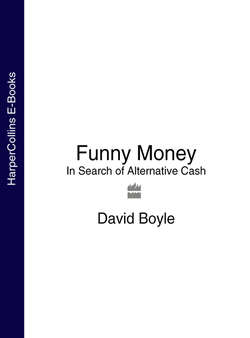Читать книгу Funny Money: In Search of Alternative Cash - David Boyle - Страница 18
I
ОглавлениеI took the Washington metro back into town wondering what had been missing from the academic study I had just witnessed, and slipped into my guesthouse in Dupont Circle. Irene was watching an ancient episode of Are You Being Served?. ‘We’re watching one of your TV shows,’ she said, falling about laughing as I passed the door. ‘Do you want to join us?’
‘It’s very old,’ I said, trying to wriggle out of responsibility for it. I needed time to make sense of what I was learning; after a few days of watching the controlled creative chaos at what Edgar called Time Dollars Ground Zero, I realized he was being much more ambitious than I had expected. He was attempting more than just providing services for old people, and much more even than creating a new kind of money. He was trying to redress the balance of the modern world from selfishness to unselfishness – encouraging people to be nice to each other. Even if you believe, as Washington ‘liberals’ tend to, that deep down people are pretty nice really, this was an enormous task. ‘You’re trying to do more than invent a new currency, aren’t you?’ I had asked him. ‘You’re trying to create a whole new economy.’
He laughed. ‘Or maybe we’re trying to create one which used to exist but doesn’t any longer.’ And this seemed to be what had been missing from the cold academic discussion earlier in the day: a sense of the powerful brand of nostalgia wielded by Farrell Didio, Tomeka Smith and Edgar Cahn as they popularize the idea – not just as a new kind of money, but as a very old kind of wealth. As his book points out, three out of four Americans don’t know their next-door neighbours. Once upon a time, there was a kind of wealth in the way people looked after each other; grandparents had a vital role bringing up grandchildren, and so on. And somehow, it doesn’t really matter whether this is true or not – it has enormous power to sway audiences.
We have got economics wrong, says Edgar. Money isn’t like water. You don’t pour it in the top and watch it filter down: hardly anybody believes that any more. It moves around a community, invigorating it like electricity. Without being plugged into the energy source, everything just goes limp.
There are anyway two economies in the economic gospel according to Cahn. One has supermarkets, bagel shops and factories, the networks which make us rich and bring us the material things we need. The other drives families, neighbourhoods and communities, the networks which educate, bring up and nurture. One is formal and the other informal. Economists study the first and only partly believe in the existence of the second, but the second needs to be energetic for the first to thrive.
‘We used to have a second economy which was invisible,’ he said. ‘And it’s the economy we don’t talk about, which used to be called community. And if we’re honest, this economy ran on the subjugation of women and slave labour. Now we live in a different world, but the community has disappeared.’
How do we get it back without the subjugation? Edgar’s first battle has been to prove the existence of this other economy to doubting economists who believe that everything has to have a price. ‘I do not know any family where someone holds up the wishbone and says “What am I bid for this tonight?”’ he says aggressively. ‘Or where the market value of walking the dog versus putting out the trash is the key factor in a household decision.’
The second stage is to show that time dollars reward and reinforce those very things that money generally doesn’t: caring for family, neighbours and friends. ‘To use the economists’ phrase, this new currency appears to increase the “competitive value” of relationships of trust, in relation to monetary gain,’ he told me. No wonder the only definition of time dollars by an economist I have come across is ‘an inferior semi-money’. Well maybe it is, but as long as it works, perhaps that doesn’t matter. And it is a semi-money which drives the kind of neighbourhood life we all depend on, like steam drives a machine.
